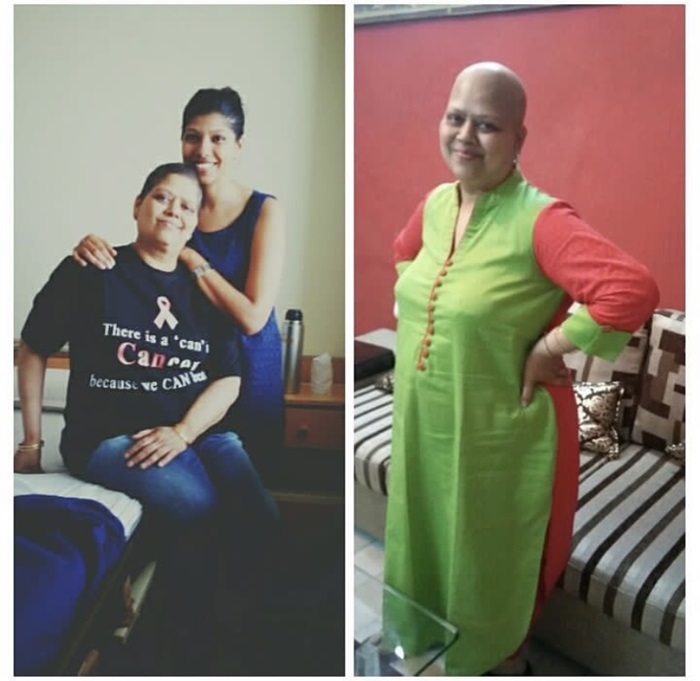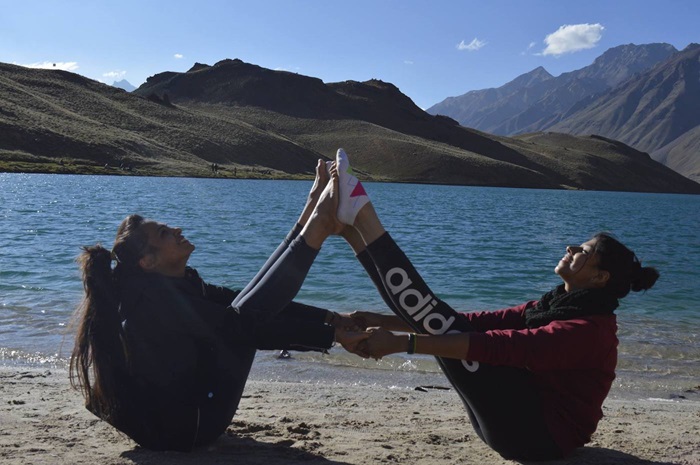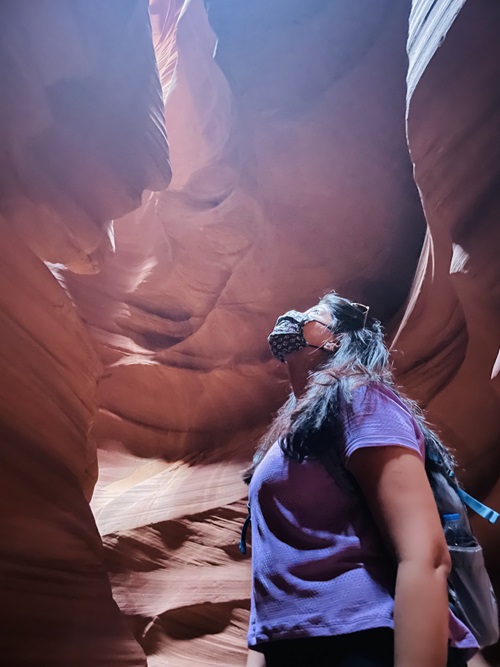Voices of GoTo: In this series we highlight the people that make flexible work, work: our employees! GoTo is a global company with more than 4,000 employees around the world; these are their stories.
Archie Jain is a Senior Data Scientist at GoTo. She takes numbers and data and turns them into knowledge and insight. Originally from New Delhi, she loves yoga and celebrating culture. In honor of Asian American and Pacific Islander Heritage Month, I sat down with Archie to talk about her story, her passions, and how we can support Asian voices and the unique cultures that accompany them. We also spotlighted the importance of mental health in recognizing Mental Health Awareness Month.


Archie, tell me about yourself and your history
I moved to the U.S five years ago and this was the first time I was traveling outside of India. Excited yet nervous, I was enthralled to embark on this journey. It was a significant change for me, but my values helped me navigate throughout this journey. Being the only child did make me feel lonely but also helped me become a keen observer and deep thinker. It led to more conversations with myself, but I always had good friends to hang out with.
I have a small family. Unfortunately, I lost my mother while I was in India but she always guides me through thick and thin. My dad is still in India and his social circle keeps him busy. He is an avid banker and has been working with a national bank for his entire life. My grandparents were homeopathic doctors, so we all took somewhat different paths in life. Initially, I thought I would return to India after getting my Master's degree, but that degree led me to this incredible career, and I stayed.

You say your family took different paths in life; what made you choose yours in tech?
I love storytelling. In high school, I wanted to pursue journalism but ended up studying engineering in IT. I always loved tech anyway. I was interested in IT; I didn’t know what I would do with it. In 11th and 12th grade, I picked up the coding language C++, and things picked up from there.
I started as an Android developer and created some apps during my first job. I liked it, but I didn’t truly enjoy it. So, I got my Master’s in Technology in India and started to dig deeper. That’s when I decided to pursue another Master’s in Analytics to learn more about Data Science and Machine Learning.
Imagine walking into your favorite candy store, the same one you’ve been going to for a few months. You usually buy the same candies, but this time you walk in, and instead of telling the store what you want, they had the sweets you wanted ready for you when you got there. It’s like magic — that’s the work I do. It’s been a fabulous journey, and I enjoy it.
What are you most proud of?
I’ve always enjoyed yoga. My school had a curriculum for yoga, as young as 4th or 5th grade. I was naturally flexible, and I picked it back up when I was 20 and did it for four to five years. One day, my yoga coach recommended that I participate in the National Level Miss India Fitness challenge.

Women in fitness across India would participate and I asked myself, “How am I going to do this? I am not into extensive training; I just love doing yoga.” What I did not realize was the natural gift of a balanced mind and body that yoga gave me. Ultimately, I didn’t win. But I sure did represent myself. I wasn’t afraid, and being around all these fit women, competing against them, even if I didn’t beat them, was an incredible experience. Not being afraid to do something is so important! I would do it again in a heartbeat.
Does your family have any traditions that are especially important to you?
Culturally, I belong to Jainism. Those values are a part of my life. One of the values is live and let live. The principles of nonviolence, those linger on throughout my life — also, humility. Every birthday, we used to go to organizations that would serve the deaf or the blind, to go and organize something that was a tradition that we followed on my birthday. So, I like to do that when I can.
What inspired you to get involved in AIM (Asians in Motion) at GoTo?
We can be honest; most companies have room for improvement in diversity. We can recognize that. I felt underrepresented, and I wanted to help change that. Someone reached out to me about starting a group, and although I had no idea what it would look like or what the goals would be, I just knew I wanted to be a part of it.

I started a Slack channel, and it gained interest. I had much content to share, and I shared a lot! Again, I love storytelling. I now lead communications for AIM, which is a good match for me. When you meet someone, you can’t make assumptions about where they come from or what their culture is. The only thing you can do is create a space where people can come together and present that themselves. So I met many people of similar cultures or mixed cultures who I never knew worked at GoTo. No matter what percentage of Asian heritage they had, they added so much value to the group and GoTo. And it was nice to uncover those voices. I’ve learned so much about other Asian cultures. And there are so many places where our different Asian cultures intersect.
I think understanding and celebrating intersectionality within cultures is fundamental. Why do you think it’s essential to celebrate Asian heritage?
I think it’s great that we dedicate a month to celebrating different heritages. It’s essential for me because it gives you a chance to appreciate someone’s background and how they’re contributing to the world. It’s also good to enjoy ourselves and learn more about our own culture. Having Asian heritage can mean so many things; it’s such a large swath of the world. There are so many parts of Asia, and even within those countries, the heritage is different. Asian heritage is so amazingly diverse and strikingly similar.
There was a series I watched, “Kim’s Convenience,” where the characters called their parents “Ama” and “Apa.” That’s what many South Indians call their parents as well. We have more similarities than we have differences. Green teas come from China and are heavily present in India as well. That’s something I feel connected to, those minor similarities that make up our lives.
However, another one — a stereotype — is rooted in some family cultures. There is the stereotype that Asian families tend to be more ambitious toward their kids. Despite its positive overtones, this stereotype damages Asian Americans and other people of color.
I know there’s a concerted effort to dismantle the myth of the “model minority.” How can we help do this?
I think we can help dismantle the myth if we look at examples of those who have done differently and done well. People like Lily Singh, a famous YouTuber from Canada. She’s been successful in a more “nontraditional career” and is well on her way to gaining even more success. Showcasing and recognizing people who have succeeded outside of the traditional jobs or careers will help.
I think that families are changing and updating their views on some of these things. If I have kids, I will not force them to be engineers or doctors. People want the best for their children. If I could have chosen my path, I would have selected journalism — who knows where I’d be! I want to think I would have done well for myself. Examples of people who have broken barriers and done something different are essential. If you’re good at something, you should be able to pursue it.
Our generations are evolving; everyone needs to have an open mindset. The shift is already here.
We can’t ignore its impact on mental health, especially as it’s also Mental Health Awareness month.
We must talk about it, especially in Asian culture. I don’t want to generalize, but most of us have felt the pressure of needing to do well. It’s just added stress that we must live with. Over time, it affects your mental health, whether you realize it or not. I never had a concept of mental health or what it involved when I was in India. Again, I’m not generalizing; I’m talking about my own experience. It’s not something that people discuss openly. People overwork themselves, and work-life balance isn’t as present.
I think we can give each other more space to talk about it and not be judgmental when we do. The freedom to take a pause and tell yourself you’re doing okay. If you’re not, it’s okay to feel that way too. It’s essential to do that instead of burying yourself under a rock and ignoring it.
What helps improve your mental health?
Honestly, not doing anything. On self-care days, I will switch off the smaller screens, lay on the sofa, and watch TV — those are all mental health things. There’s no A-B-C to accomplish; sometimes, you need to relax. I don’t think about work; it’s like an extra Sunday without the Sunday Scaries. I love to cook, so I can dedicate some time to all the different food I want to cook here and there.
Any parting words for us?
You always have more in common with someone than you might think. I met my husband here in the U.S. Our families didn’t know each other. It turns out, our family homes in India are only one mile apart. You don’t know someone’s history or background until you ask, and then you can find out that you have something in common that you would’ve never imagined. Those connections are what make life meaningful and exciting.
We work where we like, which is why we like where we work. We think you will, too. Interested in joining our team? Look at our opportunities
Connect with Archie on LinkedIn






